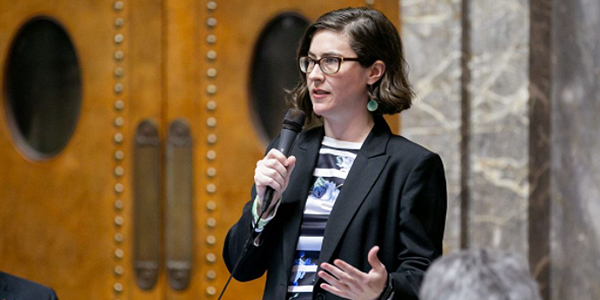A proposed Washington state tax on carbon emissions drew strong support at a Thursday legislative hearing.
Environmentalists and activists for low-income residents and communities of color praised the tax bill introduced by Democratic state Sen. Liz Lovelett. The legislation garnered a mixed response from industrial and corporate players, and a few anti-tax advocates were strongly opposed.
“This is not a bill that makes everybody happy off the bat. This is not going to be a silver bullet for climate change. … We need more work on the low-income mitigation piece,” Lovelett said at the hearing. In a separate interview, she said, “We worked hard to enfranchise everyday people in this.”
Her bill (SB 5373) would implement a tax of $25/ton of carbon emissions beginning Jan. 1, 2022. The tax rate would increase by 5% a year. Breaks would be given to energy-intensive industries vulnerable to foreign competition — a category whose exact criteria still needs to be finalized by the state government. The tax would be levied on Washington’s five oil refineries for motor fuels sold in the state but not for fuel exports.
The tax revenue would be distributed to transportation programs, low-income residents and communities of color to make homes more energy efficient and address pollution-related health problems. Funds would also help rural areas reduce carbon emissions, including transportation improvements.
The bill would require the state government to review the proposal in 2025 to see if it is meeting the goals set by a 2008 law to trim carbon emissions. In 2018, Washington’s carbon emissions totaled 99.57 million tons. The 2008 law set emission goals of 50 million tons by 2030, 27 million tons by 2040 and 5 million tons by 2050.
The committee’s staff calculated that the proposed tax would raise $1.587 billion in the 2021-2023 budget biennium, $4.162 billion in 2023-2025 and $4.595 billion in 2025-2027.
Fifty-three of 68 people testifying Thursday supported the bill. The majority belonged to environmental and social advocacy organizations. They also included some local government officials, a few farmers and labor interests.
Supporters liked money going to transportation programs and pollution mitigation measures for low-income communities, arguing that polluting industries tend to be in low-income neighborhoods and communities of color. Allocations to help farms deal with carbon-emission costs and equipment upgrades also drew fans.
“It solves multiple problems at one time,” said Bobby Righi, representing Puget Sound Advocates for Retirement Action. Judy Twedt of the Union of Academic Student Employees and Postdocs Local 4121, said, “It generates much needed revenue for unhealthy communities.”
Tax Resistance
Opponents zeroed in on taxes.
Tim Eyman, Washington’s leading anti-tax activist, noted that the state voters defeated carbon tax initiatives by 59% to 41% in 2016 and by 57% to 43% in 2018. (See High Failure Rate for Western Ballot Initiatives.) “I think people are angry and frustrated, and rightly so because people in Olympia are ignoring them,” Eyman said. Washington resident Jeff Peck added, “What you see are two-legged ATMs running around.”
The Washington Farm Bureau opposes carbon taxes on general principle but liked that some revenue would go to agriculture — with the caveat that farming should be a higher priority in distributing that money.
The Association of Washington Business, the state’s leading business-lobbying organization, and the food processing organization Food Northwest opposed Lovelett’s bill because it does not sufficiently protect facilities vulnerable to foreign trade or define the criteria for designating such facilities.
The Western States Petroleum Association (WSPA) is neutral on the bill, waiting to see how subsequent tweaks turn out. Those tweaks include how the final bill addresses industries vulnerable to foreign competition. However, U.S. Oil & Refining supported the bill, believing it incentivizes industry to lower emissions.
WSPA representative Jessica Spiegel voiced concern about the multiple carbon emissions bills currently in play in the legislature. These bills include a complicated cap-and-invest program (SB 5126), a plan to trim the carbon content in motor fuels (HB 1091) and a requirement that all new car sold in Washington be electric by 2030 (SB 5256). (See Wash. EV Bills Spark Concern About Buildout.)
“We need a single approach. Unfortunately, right now we have a scattershot approach,” Spiegel said.
The two biggest bills in play are Lovelett’s and Democratic Sen. Reuven Carlyle’s cap-and-invest bill, which is a more complex version of a cap-and-trade program.
In her interview, Lovelett said both bills can coexist because they largely complement each other.
But Dr. Annmarie Dooley of Physicians for Social Responsibility disagreed. “Cap-and-invest is like allowing public smoking in a hospital as long as they donate to the hospital,” she said.



